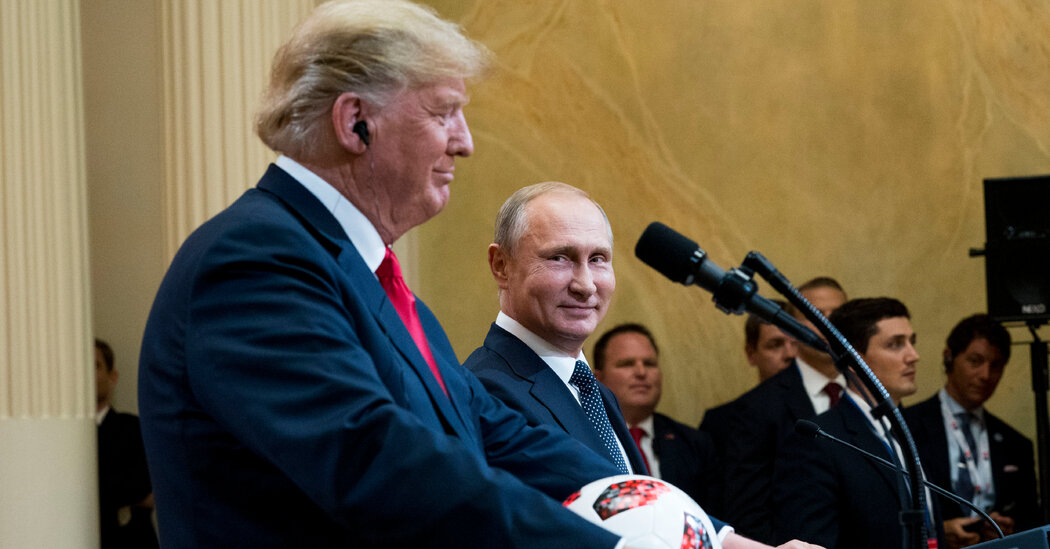
PARMA, Ohio — Ukrainian Americans, watching the Russian attack on their homeland with horror and anger on Thursday, described Ukraine as vulnerable and helpless — but also as a country with the same aspirations as the United States.
“Americans have to realize that this is about freedom and being able to live one’s life as they see fit, to govern as they want to, and not to be put under the power of a dictator’s ego,” said the Very Rev. John Nakonachny, 75, pastor of St. Vladimir Ukrainian Orthodox Cathedral in Parma, Ohio, a Cleveland suburb with a sizable Ukrainian population.
“Isn’t caring about what happens in Ukraine something Americans would get behind?” he asked.
Peter Teluk, 55, worked in Ukraine for 25 years as a consultant for American business interests and returned to the United States last year. He urged Americans not to turn a blind eye to the conflict.
“The U.S. has a short attention span and has a desire to think less about foreign conflict these days,” said Mr. Teluk, a lawyer in the Cleveland area. But he said the United States should appreciate that Ukraine was “symbolically what we want the rest of the world to be — a country that wants to define what it is by themselves.”
“We should understand that,” he continued, “because that is what we have always believed.”
Taras Szmagala Jr., the board chairman and president of the Ukrainian Catholic University Foundation, said President Vladimir V. Putin of Russia was threatened by the growing independent voice of middle-class Ukrainians. Russians, he said, are hearing those voices and seeing what a democracy can bring them.
“Ukrainians are maturing as a society and they are getting better over time, and that is a threat to Putin,” he said. “The Americans and the media need to see that side of things.”
Across the nation, Ukrainian immigrants said they felt a profound sense of helplessness as they heard from panicked relatives who felt trapped as much of their home country was transformed into a war zone.
“I didn’t sleep all night. I talked to my brother and sister. They are so scared,” said Tanya Vlasenko, 48, of Vancouver, Wash. “There is nothing we can do, only pray,” she said, weeping.
Vancouver and nearby Portland, Ore., are home to more than 20,000 Slavic Christians. Most of them are Ukrainians who began settling in the Pacific Northwest in the 1990s with refugee status, after fleeing religious persecution. They have erected dozens of churches that are the center of community life.
At First Slavic Evangelical Baptist Church, where Ms. Vlasenko’s family worships, the pastor has been leading congregants in prayer since Russian military action in Ukraine became a possibility.
Salah Ansary, senior district director for Lutheran Community Services Northwest, a refugee resettlement agency, said anxious Ukrainian immigrants had been calling to ask how they could get their relatives out of the country.
“We don’t have good information to provide, or anything to offer that can give them any kind of comfort at this moment,” he said. “The situation is so fluid.”
Solomia Gura, 31, of Philadelphia, said it had become increasingly difficult to reach people in her home country who have taken refuge in bunkers.
“I am trying to check if everybody is alive, if no bomb hit them,” said Ms. Gura, whose mother and brother live outside Lviv, a city in western Ukraine that had not been spared from the Russian military incursion.
Ms. Gura said she planned to attend a rally for Ukraine on Friday in Philadelphia, where about 70,000 Ukrainians and Ukrainian Americans live.
“That’s as much we can do is show our support,” said Ms. Gura, her voice laden with exhaustion and tears.
Irena Mykyta, 60, an immigration lawyer in New York, said that, like her relatives and friends in Ukraine, she was incredulous her home country was under attack.
“I feel useless and guilty that I am a Ukrainian here,” said Ms. Mykyta, who has lived in the United States for 26 years and is a naturalized citizen. “Ukraine is helpless and we are helpless here.”




